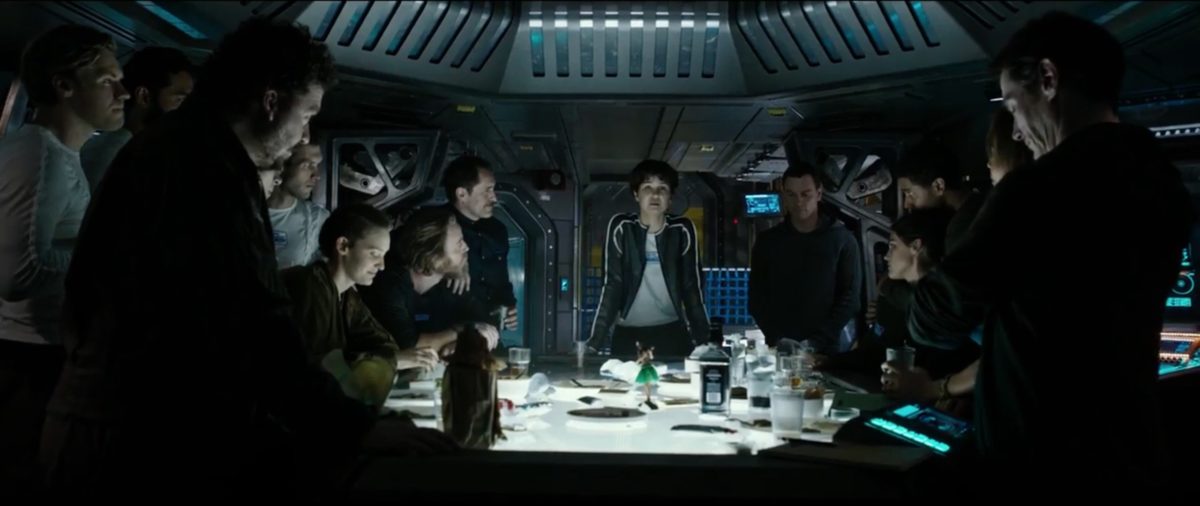No film franchise is as wildly unique as Alien. The first film is a horror masterpiece, creating a haunted house in space with one of the most creative and classic creature designs of all time. This was followed by three sequels and a prequel, all of which explored the monster and it’s universe in different ways. From the action-packed Aliens to the nihilistic screed of Alien 3 to the more contemplative Prometheus, every film is unique in its own way, which makes this series one of the weirdest franchises ever assembled. Alien: Covenant explores that tonal and genre inconsistency by combining the horror of Alien, the action of Aliens, the tone of Alien 3, and the introspective exploration of Prometheus — with mixed results.
Ten years after the events of Prometheus, colonization ship Covenant traverses the galaxy in an attempt to settle human life on a new planet. After an electromagnetic shock damages the ship and kills the captain in cryosleep, a rogue transmission is received singing “Take Me Home, Country Roads.
” Finding the source of the transmission on a planet that appears to be hospitable for human life, the crew of the Covenant decide to investigate further.
Once there, they find an alien world filled with horrors unknown, as well as David, the sole survivor of the Prometheus expedition.
Ridley Scott’s first attempt at prequel-izing the Alien films, Prometheus, was a misfire on all counts. While it is still one of the most gorgeous looking blockbusters of the past decade, the film attempted to thread a needle and meld the cosmic horror of Alien with the more meditative nature of something like 2001: A Space Odyssey and failed on both accounts. Alien: Covenant, on the other hand, is much more successful and adept at handling the “big questions” while also being a mostly satisfying horror film.
Central to these questions is Michael Fassbender’s dual role as David and Walter, two synthetic androids of similar model type, but with vastly differing programming. A significant portion of the film pits Walter and David in a room, merely verbally sparring over the meaning of life, love, and creation. The latter of which is the overarching theme of the entire film, narrowing Prometheus’s focus from the concept of the who, what, where, when and why of Humanity’s origin and instead pondering what it means to create and be created. It’s a subtle difference, but this laser focus, alongside an improved script from John Logan and Dante Harper, allow Covenant to shine where Prometheus floundered.
Fassbender is, again, putting in series best work as the two android brothers, continuing to prove he is one of the great actors working today. David’s logical, yet maniacal, quest to create and his obsession with humanity’s imperfections is perfectly contrasted by Walter’s unending sense of duty.
While the vocal contrast is the most easily picked up difference, Fassbender adds much more subtle variances that help differentiate between the two characters — Walter is stoic, where David’s reactions feel more “human”.
The rest of the cast are, unfortunately, given the short end of the stick for most of the film, with only a few characters really standing out. Katherine Waterson is workmanlike as our main protagonist Daniels, adding yet another attempted Ripley analogue to the franchise that mostly falls flat. Billy Crudup overacts his way through his role as new Covenant captain Christopher Oram, tic-ing constantly as he delivers corny dialogue about how he’s persecuted because of his faith — a thematic strand that goes absolutely nowhere. Even some of the better performances in the film, like Demain Bichir’s cigar-chomping Lope, are given little in a way of characterization in the script.
That said, the most stunning performance of the film is Danny McBride as Tennessee, the pilot of Covenant. McBride is a phenomenal comedic actor, constantly outshining his fellow castmates in films like Pineapple Express, Hot Rod, This is the End and Your Highness. Alien: Covenant, however, gives McBride a chance to show off all of his talents and his performance never feels stretched. McBride sells the humor, tragedy, drama, confidence, and conflict within his character and it’s a marvel to watch someone so famous for roles like Kenny Powers become a well rounded actor right before your eyes.
Alien: Covenant feels more at one with the likes of Alien 3 than any of the other films, both in terms of thematic content and overall quality. This is a brutal and mean film — it posits that everything you know and love will die, as will you, and that the only things that will live on are your creations.
It’s not as overwhelmingly nihilistic as Alien 3, but that macabre overarching theme feels very at peace with David Fincher’s maligned entry in the series.
Covenant also feels disjointed like the third film did, with tonal shifts and rushed plotting that makes the final act a combination of lackadaisical and occasionally laughably bad. Going from philosophical conversations between Walter and David into a full blown martial arts fight is a jarring experience, and it only gets worse by the time the film ends — you’ll see. The films finale also suffers from feeling too rushed, causing the film to veer wildly during what should be the film’s climax.
Even taking these flaws into account, Alien: Covenant is the best Alien-related film since at least 1992. The Xenomorph, as well as the new additions to the family, all feel like their structural perfection is matched only by their hostility for the first time in decades. And while Covenant never reaches the terrifying highs of Scott’s original 1979 masterpiece, Alien: Covenant feels like, for better or worse, the film that Prometheus promised to be — a big sci-fi horror film that tackles big questions while never losing sight of it’s B-movie roots. It sits firmly in the middle, somewhere next to Alien 3 in the pantheon of this series. No better, but no worse.







